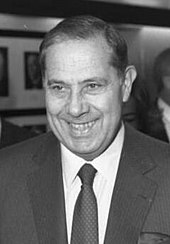Rassemblement pour la France et l'indépendance de l'Europe
The Rassemblement pour la France et l'indépendance de l'Europe (RPF-IE; "Union for France and the Independence of Europe"), or Rassemblement pour la France (RPF) for short , is a party of the national conservative Eurosceptics in France . She invokes the ideas of Gaullism and sovereignty . The party was founded in 1999 and was active until 2011 (but is not officially dissolved).
history

The background to the establishment of the RPF was a split in the Gaullist party Rassemblement pour la République (RPR) in view of the advancing European integration through the EU treaties of Maastricht (1992) and Amsterdam (1999). At the RPR party congress in Le Bourget in 1990, Charles Pasqua and Philippe Séguin submitted a program proposal entitled Rassemblement pour la France , which called for a return to the populist and social principles of Gaullism and rejected further expansion of European institutions. This proposal was supported by 31.4% of the delegates, while the majority supported Jacques Chirac and Alain Juppé , who advocated further European integration. In the referendum on the Maastricht Treaty, the RPR was split between supporters and opponents, and the “yes” narrowly prevailed. For the European elections in 1994 , however , Philippe de Villiers founded the Mouvement pour la France (MPF) as a movement of bourgeois-conservative opponents of Maastricht. It received 12.3% of the vote and 13 seats in the European Parliament . On the occasion of the Amsterdam Treaty, Parliament changed the constitution at the beginning of 1999 in order to be able to ratify the treaty without another referendum, and the majority of the RPR MEPs also agreed.
There was resistance to this transfer of sovereignty without consulting the people. In June 1998 Charles Pasqua founded the Demain la France movement against the Amsterdam Treaty, and in December 1998 he resigned as political advisor to RPR chairman Philippe Séguin. For the European elections in June 1999 , the Mouvement pour la France of Philippe de Villiers and the RPR dissenting group Demain la France of Charles Pasqua formed the joint list Rassemblement pour la France et l'indépendance de l'Europe . The RPF received 13.1% of the vote and 13 of the 87 French seats in the European Parliament. This made it the second strongest force after the Parti socialiste and before the official RPR list. The representatives of the RPF sat in the EU-skeptical Union for Europe of the Nations (UEN; together with the MEPs of the Italian Alleanza Nazionale and the Irish Fianna Fáil ), chaired by Pasqua.
In June 1999 the RPF was registered as a political party, the founding party congress took place in November 1999, the MPF was temporarily absorbed into it. Philippe de Villiers and five other MEPs left the RPF the following year and re-established the Mouvement pour la France. In addition to Pasqua, only five MEPs (including Jean-Charles Marchiani ) remained in the RPF. In the 2002 presidential election , RPF chairman Charles Pasqua just missed the parrainages required to run . In the following parliamentary elections in 2002 , the RPF won two seats in the National Assembly . From 2002 to 2011, Charles Pasqua served in the Senate for the RPF . From 2002 to 2009 the RPF was a member of the national-conservative European party Alliance for Europe of Nations (AEN), together with u. a. Fianna Fáil, Alleanza Nazionale, the Danish People's Party and the ADR from Luxembourg.
A group of local elected officials of the RPF organized itself from October 2002 in the association Nation et Progrès , which was associated with the center-right collecting party Union pour un mouvement populaire (UMP) - dual membership in the RPF and UMP was permitted. In the 2004 European elections, the party missed re-entry into the European Parliament with just 1.7% of the vote. In 2007 and 2012, the party renounced its own presidential candidate in advance and instead supported Nicolas Sarkozy from the UMP. Since Pasqua's departure from the Senate in 2011, the party no longer has any parliamentary seats and is no longer significant. François Asselineau , previously a senior member of the RPF, founded his own party Union populaire républicaine (UPR) in 2007 . The party Debout la République (since 2014 under the name Debout la France ), split off from the UMP in 2008 , takes a similar political position as the RPF before.
The Rassemblement Pour la France (RPF) party, founded in 2013 and led by former MP Christian Vanneste , who was expelled from the UMP due to homophobic statements, must be distinguished from the RPF-IE Charles Pasquas .
Individual evidence
- ↑ Udo Kempf: From de Gaulle to Chirac. The French political system. 3rd edition, Westdeutscher Verlag, Opladen 1997, p. 188.
- ↑ Laurent de Boissieu: Rassemblement pour la France (RPF) , France-politique.fr, June 4, 2019.
- ^ Alliance for Europe of the Nations , EU Observer, June 25, 2002.
- ^ Pasqua: "rien à voir avec Vanneste et Stoquer". Europe 1, March 26, 2012.
- ↑ Presidential: l'ex-député du Nord Christian Vanneste appelle à voter Le Pen. In: France 3 Hauts-de-France , April 30, 2017.